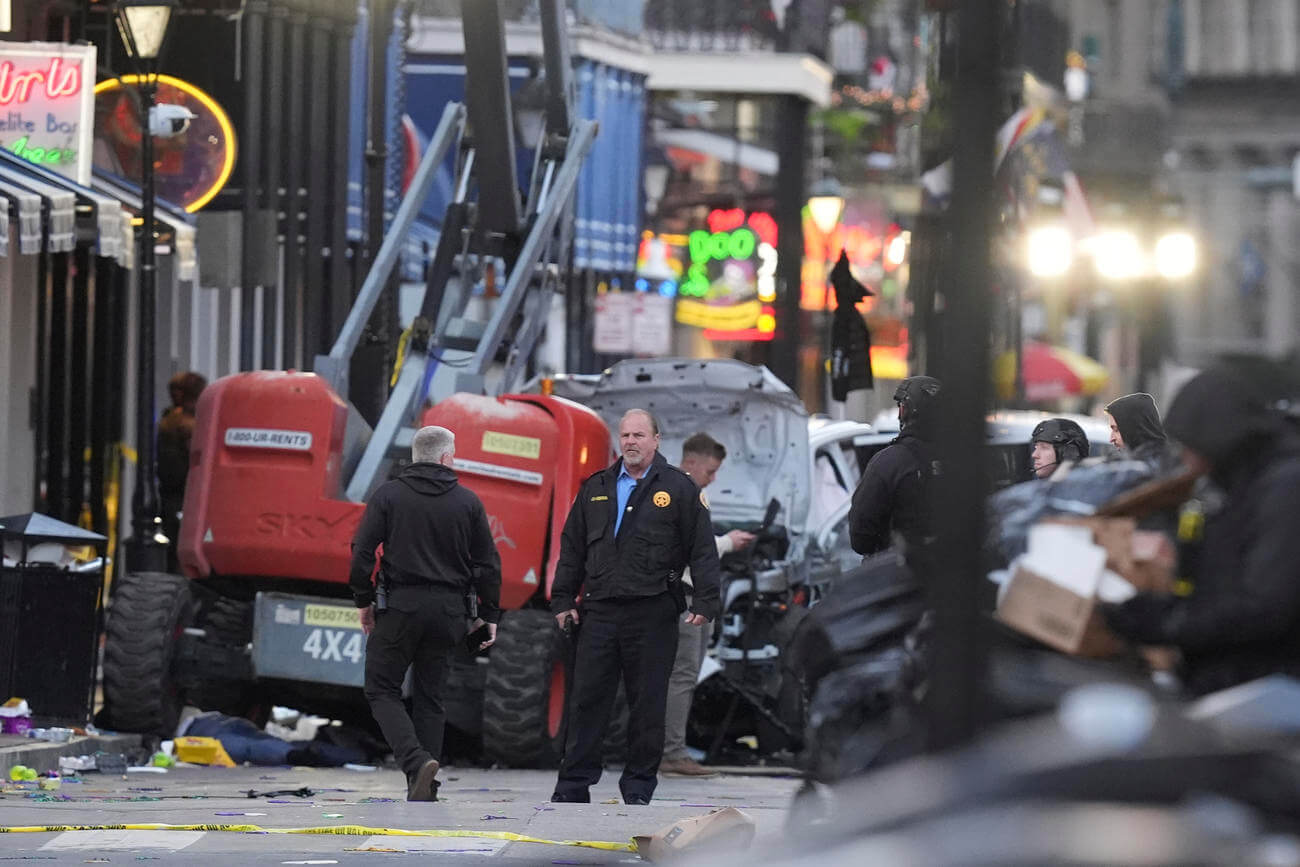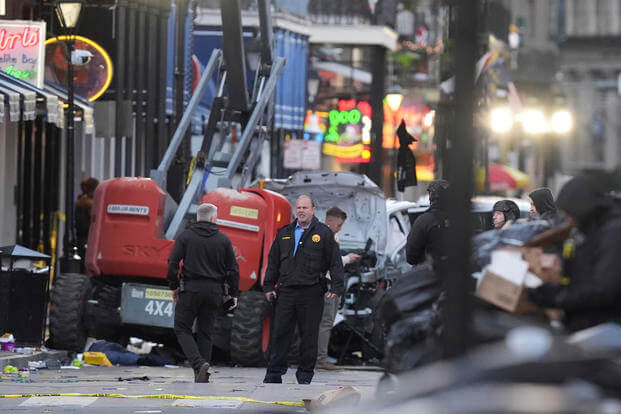

The man who federal officials say was responsible for a ramming attack that killed at least 15 people in the early hours of New Year’s Day in New Orleans had served in the Army for more than a decade, according to records from the service.
Shamsud-Din Jabbar, 42, a U.S. citizen from Texas, was the driver of a rented Ford pickup truck that he managed to steer around a police blockade before barrelling down iconic Bourbon Street, according to the FBI.
The federal agency said that it found weapons and “a potential IED” in the car after Jabbar was killed in a shootout with police, and President Joe Biden said that “hours before the attack, he posted videos to social media indicating that he was inspired by the Islamic State terrorist group, expressing a desire to kill.”
Years prior to this attack, when Jabbar was in his early 20s, he first flirted with joining the Navy before eventually enlisting in the Army. However, based on the records released by the service, Jabbar didn’t have any jobs or training that would have taught him the skills necessary to make improvised explosives and it doesn’t appear that he would have had close contact with the Islamic State.
A Navy spokesperson said Jabbar enlisted in the sea service on Aug. 12, 2004, in Houston and entered into the Delayed Entry Program. However, a month later, on Sept. 13, he was discharged from the Navy and never actually went to boot camp.
The Navy did not offer any details as to why he was discharged.
Three years later, however, in March 2007, Jabbar enlisted in the Army and first served as a human resource specialist before becoming an information technology specialist, a spokesperson for the service said.
Both positions are not considered combat-related and, as such, would not have exposed Jabbar to any specialized weapons or explosives training.
The Army also said that Jabbar deployed to Afghanistan from February 2009 to January 2010 at a time when newly elected President Barack Obama was surging troops into the country.
The Army did not immediately release information about what awards Jabbar earned while in the service, and it offered few other details about Jabbar’s service, including where he was stationed or what units he was assigned to.
However, public records show that, by the end of his active-duty career, Jabbar was stationed at Fort Liberty — then known as Fort Bragg — in North Carolina.
A Facebook post from 2013, posted by the 1st Brigade Combat Team, 82nd Airborne Division, said that Jabbar, then a staff sergeant, was the information technology team chief for the unit stationed at the base.
Years later, in a now-deleted website for a real estate company he founded, Jabar said he “ran a service desk responsible for support services to thousands of soldiers.”
Around that same time, in 2012, Jabbar filed for the first of two divorces, according to North Carolina court records.
In January 2015, Jabbar left active-duty service, but this transition appeared to be a challenging one for him, with his first wife telling The New York Times on Wednesday that he “struggled with adjusting to civilian life after leaving active-duty military service about a decade ago.”
It is also not clear when in his life Jabbar became a Muslim, much less radicalized into believing the Islamic State ideology. The terrorist group, also known as ISIS, emerged more than a decade ago, seizing territory in the Middle East, waging deadly attacks on the West including a Paris plot that killed 130 people, and triggering a U.S. military operation in Iraq and Syria that continues to this day.
The current husband of Jabbar’s first wife told several news outlets that Jabbar had converted to Islam and had started to act erratically in the last few months, while his brother told The New York Times that he had been “a Muslim for most of his life.”
Jabbar moved from active duty straight into the Army Reserve, still working as an IT specialist, until he finally left the Army in July 2020 still a staff sergeant, according to service records.
While in the reserves, court records show that Jabbar moved to Texas and remarried in 2017, though that marriage also ended in divorce.
Texas records show that Jabbar filed for divorce from his second wife in July 2020 — the same month he left Army reserves — in a court just outside of Houston.
Days after the filing, his wife was granted a restraining order that said he was not allowed to threaten either her or their child with “imminent bodily injury,” make anonymous late-night calls, or destroy their property. His second wife was also subject to the order’s restrictions.
However, the couple soon agreed to drop the matter. But a year later, Jabbar again filed for divorce.
Financial disclosures filed by Jabbar portrayed the couple as relatively impoverished, with most of their bank accounts completely empty despite him having a job with the consulting company Deloitte that paid him a salary of more than $120,000 a year.
In his financial statements, Jabbar said that he was spending nearly $9,000 a month — with around $2,000 of that just on credit card debt and student loans — while taking home only around $7,500.
Meanwhile, his second wife, in her filings, said that Jabbar had been wasting their money, including “excessive cash withdrawals, gifts to paramours, unreasonable and unnecessary spending and the improper accumulation of debt.”
The divorce was granted in September 2022, and the court ordered that Jabbar have his wages garnished.
Jabbar’s attack is likely one of the deadliest Islamic State-inspired assaults on U.S. soil and comes just months after the Department of Homeland Security warned that the threat of terrorism was expected to be high, especially due to the ongoing Israel-Hamas war.
“Foreign terrorist organizations, including ISIS and al-Qaida maintain their enduring intent to conduct or inspire attacks in the Homeland,” the agency warned in October.
Just days after that announcement, the Department of Justice announced it had arrested an Afghan man who was living in Oklahoma for plotting to “conduct a violent attack on U.S. soil in the name of ISIS” on Election Day.
Late on Wednesday, the FBI released an update that said it was “conducting a number of court-authorized search warrants in New Orleans and other states” as part of its investigation into Jabbar.
Related: FBI Finds 150 Homemade Bombs at Virginia Home in One of the Largest Such Seizures, Prosecutors Say
